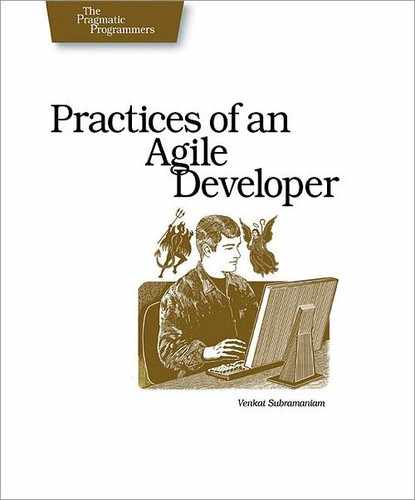Chapter
8
Agile Collaboration
I not only use all of the brains I have, but all I can borrow.
Any nontrivial project requires a team of people. The days of building a full product alone, in your garage, have pretty much passed us by. But working in a team is very different from working alone; suddenly, your actions have consequences on the productivity and progress of others in the team and on the entire project.
The success of a project depends on how effectively the people on the team work together, how they interact, and how they manage their activities. Everyone’s actions must be relevant to the context of the project, and in turn each individual action affects the project context.
Effective collaboration is a cornerstone of agile development, and these practices will help keep everyone involved and headed in the right direction—together.
The first step you want to take is to Schedule Regular Face Time, here. A face-to-face meeting is still the most effective way to communicate, so we’ll start with that. Next, you want to get everyone in the game. That means Architects Must Write Code (we’ll see why here). And since you and your team are all in this together, you want to Practice Collective Ownership (that’s here) to make sure you aren’t held hostage by any one team member. This is a collaborative effort, remember?
But effective collaboration is more than just banging code out the door. Everyone on the team needs to refine and improve their skills over time and grow their careers. Even if you’re just starting out, you can Be a Mentor, and we’ll see how here. Many times you’ll know the answer to something that a teammate may not know. You can help grow the team if you Allow People to Figure It Out, as we’ll see here.
Finally, since you are working together on a team, you need to modify some of your personal coding practices to accommodate the rest of the team. For starters, it’s polite to Share Code Only When Ready (starting here) so as not to encumber your teammates with half-baked works in progress. When you’re ready, you’ll want to Review Code with other team members (and we’ll look at that here). As the project rolls along and you complete tasks and take on new ones, you need to Keep Others Informed about your progress, problems you’ve encountered, and neat things you’ve discovered. We’ll conclude with that practice here.
